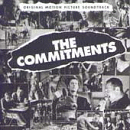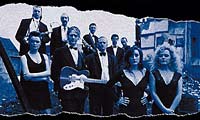FILM NOTES
FILM NOTES INDEX
NYS WRITERS INSTITUTE
HOME PAGE

(Irish, 1991, 120 minutes, color, 35mm)
Directed by Alan Parker
Based on a novel by Roddy Doyle
Cast:
Robert Arkins . . . . . . . . . . Jimmy Rabbitte
Michael Aherne . . . . . . . . . . Steve Clifford
Angeline Ball . . . . . . . . . . Imelda Quirke
Maria Doyle Kennedy . . . . . . . . . . Natalie Murphy
Dave Finnegan . . . . . . . . . . Mickah Wallace
Andrew Strong . . . . . . . . . . Deco Cuffe
Colm Meaney . . . . . . . . . . Mr. Rabbitte
Joey Fagan . . . . . . . . . . Johnny Murphy
In Alan Parker's films, insular ethnic groups come to know the lives of other, often equally inwardly focused groups, and in meeting, find themselves deeply changed. Sometimes, that change is an enrichment, but just as often it is an impoverishment. The ways in which groups meet cultural challenges is the source of the suspense of much of Parker's work. In MISSISSIPPI BURNING (1989), whites in rural Mississippi resent the intrusion of FBI agents, themselves exponents of a narrowly defined culture. In the process, the whites become either agitated and more harshly racist, or reluctantly moved to reconsider their own ideas of race. They emerge from the confrontation enlightened or murderous, but now forever conscious of another world. In COME SEE THE PARADISE (1990), the lives of the California Nisei are shattered by forced deportation and imprisonment during World War II. Parker looks closely at the customs and traditions of the Nisei, but he is perhaps more fascinated by the reactions of the whites around them. These whites are, variously, uplifted or traumatized by their meeting with the Nisei, but we know at the fade out that they will never be the same people they were.
THE COMMITTMENTS presents the unlikely collision of working class Dubliners and African American soul musicians, and Parker makes the meeting of cultures literally sing in a witty, sentimental, and ultimately soulful movie. An idea borne of economic desperation, boredom, naivete, and chutzpah takes wings with a pawnshop drum kit, a rusting saxophone, and a more or less stolen piano: why not start a band? Why not, indeed? A group of scruffy Dublin teens finds themselves with a rehearsal hall filled with the debris of a bankrupt business, and in spite of this inauspicious omen, they plunge ahead. They are completely sustained by their love for the sweet soul music of Otis Redding, Wilson Pickett, Aretha Franklin, and Jackie Wilson. Varying degrees of talent are reconciled, and the band begins its weird rise to the top of the local music scene, as the sound of Muscle Shoals envelopes Dublin's Northside district or is it the other way around? The band's initial experiments are awful in the extreme, but gall and passion, as well as an emerging dynamic within the group, come to make the Committments' complete lack of experience seem a minor impediment.
If the mixture of Ireland and the Mississippi Delta seems odd, listen to Irish rockers as diverse as Thin Lizzie, U2, Van Morrison, and Sinead O'Connor; Ireland's musical soul has always had affinities with Black music. In the Delta cotton patches, in Harlem and Detroit and Chicago and Memphis and the other urban ghettoes of America, it's often said that you've got to be laughin' to keep from cryin', got to be singin' to keep from weepin'. Ireland, a land of incredible beauty and destitution side by side, knows this well, and it has given birth to a literary and musical tradition that is as vivid and creative as any in the world, and perhaps more distinctively bluesy than any place outside of the Delta. Dublin itself, as James Joyce showed, is an immensely hospitable place for the melding of disparate aesthetic traditions into an alloy both rich and strong.
In THE COMMITMENTS, however, the meeting of cultures is implied, rather than actual. A portion of the film is built around whether soul music legend Wilson Pickett will appear at a Commitments gig, turning it into a kind of royal command performance. But mostly, we feel rather than see the profound empathy between the Irish heart and American soul music. What we do see are the goofy, winningly real members of the Committments, a group of mostly non professional actors Parker wisely cast for their rough edged humor, and because he saw in them an emotional expressiveness unmitigated by "training." Dublin's gray, scrofulous Northside blooms with their commitment to their music. The community, initially skeptical, comes together as the Commitments become "their" band, a source of pride in a place where pride is hard to come by. The very passions which bring the band together, though, constantly threaten to drive them apart. This tension makes their music explosive and thrilling, anything but another distressing white "cover" of Black accomplishments. In THE COMMITTMENTS, Alan Parker shows the power of music to restore and unite a battered community. Soul, it seems, is as healing as it is universal.
—Kevin J Hagopian, University of Pennsylvania
 “Alan Parker’s The Commitments is a loud, rollicking, comic extravaganza about a rock band from the poorest precincts of North Dublin that decides to play soul music. The organizer of the band is the lean, ingenious Jimmy Rabbitte (Robert Arkins), whose suggestion is greeted with puzzlement by his friends. They like soul music, yes, but they don’t particularly identify with it. Rabbitte’s logic is persuasive: “The Irish are the blacks of Europe. Dubliners are the blacks of Ireland. North Dubliners are the blacks of Dublin.”
“Alan Parker’s The Commitments is a loud, rollicking, comic extravaganza about a rock band from the poorest precincts of North Dublin that decides to play soul music. The organizer of the band is the lean, ingenious Jimmy Rabbitte (Robert Arkins), whose suggestion is greeted with puzzlement by his friends. They like soul music, yes, but they don’t particularly identify with it. Rabbitte’s logic is persuasive: “The Irish are the blacks of Europe. Dubliners are the blacks of Ireland. North Dubliners are the blacks of Dublin.”
“The movie is based on a novel by Roddy Doyle, a North Dublin school teacher, but it is founded on charm. Parker introduces a Dickensian gallery of characters, throws them all into the pot, keeps them talking, and makes them sing a lot. . . . “The Commitments” is one of the few movies about a fictional band that’ able to convince us the band is real and actually plays together.
“Jimmy Rabbitte is the mercurial force at the center of the group, holding it together, but the real star of the music is a large, shambling, unkempt young man named Deco Cuffe (Andrew Strong). After Rabbitte has disappointing luck at a series of auditions for his new band (there’s a funny montage showing the would-be talent knocking at his door), he finds Deco at the wedding party, where he picks up the microphone and begins to sing while the band is on break.
“Strong’s discovery in real life was scarcely less of a happy chance: He is the 16-year-old son of a Dublin singer that Parker was using to rehearse with, and when the father grew hoarse, the son stepped in, and Parker cast him on the post. He’s one of those oversize, big-voiced natural talents, with the look of Meat Loaf and the verbal style of Joe Cocker, and he gives the music in the movie a driving energy.”
— Roger Ebert, Chicago Sun-Times
“What The Commitments has is that rarest of all things; it’s got soul. Soul, in fact, is the movies’ ruling principle, its Holy Grail and its nirvana. . . .
“The film’s script—which Roddy Doyle adapted from his novel with Dick Clement and Ian La Frenais—is beautifully structured and tight as a drumhead. This is a deadly funny movie; nearly every scene is broken off with a punch line. But Parker’s sense of comedy is organic; he never lets the jokes elbow the characters, or the music, out of the spotlight.
“Parker keeps all the film’s elements in balance. Every nuance is on the beat. The cast of players is large, but each character vividly emerges as a distinct personality. . . .
“The movie couldn’t be as great as it is if it weren’t made by passionate musical connoisseurs. When the band starts to click, we feel like we know why; we know what’s been missing, and feel their little epiphanies, both viscerally and intellectually. When they hit their groove, we’re right in step with them. . .
“Most of the actors are novices, and there’s not a slouch among them; they take to the screen with uncanny ease, both individually and as members of an ensemble. Parker has to get a lot of credit for this, as he does for giving us the dilapidated atmosphere of the movie’s setting. Like the American music that captured the spirit of the black slums, the movie captures the texture of Dublin’s decaying, rough-and-tumble working-class culture. But the social conditions aren’t shoved into the foreground; they give the movie its backbeat, its roots.
“Then there’s the sheer pleasure of watching the group perform. Most music movies give us small samples of the band’s performances, but in this one the music provides the heartbeat. Parker knows how to showcase the band in its onstage appearances. The bottom line, though, is the music itself, and during numbers like ‘Take Me to the River,’ or ‘Dark End of the Street,’ or ‘Try a Little Tenderness,’ a feeling of sheer, irresistible delight moves through you.”
— Hal Hinson, Washington Post
About Roddy Doyle
Roddy Doyle’s trilogy of novels about the Irish Rabbitte family, known informally as the “Barrytown trilogy,” has been internationally acclaimed for wit, originality, and powerful dialogue. Each of the three books—The Commitments (1988), The Snapper (1990), and The Van (1991)—focuses on a single character of the large Rabbitte family who live in Barrytown, Dublin. They are “a likeable, rough, sharp-witted clan,” declared Lawrence Dugan in the Chicago Tribune. Typical working-class citizens, the Rabbittes are a vivacious and resilient household, lustily displaying an often ribald sense of humor.
The Commitments is, perhaps, Doyle’s most well-recognized work. The successful novel was adapted in 1991 into a very popular screenplay by Doyle, Dick Clement, and Ian La Frenais, and directed by award-winning filmmaker Alan Parker. In both the novel and the film, Doyle’s wit and originality are evident.
Doyle’s second novel, The Snapper, focuses on Sharon Rabbitte, Jimmy’s older sister, who is young, unmarried, and pregnant. Refusing to reveal the identity of the father of her “snapper,” Sharon’s predicament has the Rabbitte household in a tizzy, and she becomes the target of humorous speculations by the Barrytown citizens. Shortlisted for Britain’s prestigious Booker Prize, Roddy Doyle’s third Rabbitte novel, The Van, changes the focus to Jimmy Sr., the ribald, fun-loving father of the Rabbitte family, who has been recently laid off work.
Doyle’s next book, Paddy Clarke Ha Ha Ha, was awarded the prestigious Booker Prize in 1993. The novel is written from the point of view of Paddy Clarke, a ten-year-old Irish boy, whose often humorous escapades become gradually more violent and disturbing as the story progresses.
Alan Parker Selected Filmography
Director, Writer, Producer Angela’s Ashes (1999)
Evita (1996)
The Road to Wellville (1994)
Director Mississippi Burning (1988)
Fame (1980)
Angel Heart (1987)
For additional information, contact the Writers Institute at 518-442-5620 or online at https://www.albany.edu/writers-inst.
 The Commitments
The Commitments